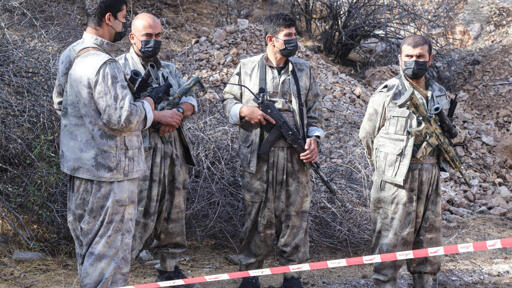Ankara (AFP) – The Kurdish militant PKK said Monday its forces had withdrawn from a key border area in northern Iraq in a move aimed at shoring up the peace process with Turkey.
The pull out comes six months after the Kurdistan Workers’ Party (PKK) formally renounced its armed struggle against Turkey, drawing a line under four decades of violence that had claimed some 50,000 lives.
“As of the evening of November 16, our forces… in the Zap region have been withdrawn,” the group said in a statement published by Firat news agency.
“Currently the risk of conflict in the area has been completely eliminated,” it said, describing the withdrawal from Zap as a “significant practical contribution” that showed the PKK’s “commitment” to ongoing efforts to reset ties with Ankara.
“We believe this new step will serve the resolution of the Kurdish issue and will help with the peace and democratisation of Turkey.”
Ankara began indirect talks with the PKK late last year, with its jailed founder Abdullah Ocalan in February urging his militants to lay down their weapons and embrace democratic means to advance the Kurdish cause.
After formally announcing their dissolution in May, they began destroying their weapons in July and in late October, began withdrawing all their forces from Turkish soil to northern Iraq.
Turkey has set up a cross-party parliamentary commission to lay the groundwork for the peace process and prepare a legal framework for the political integration of the PKK and its fighters.
The PKK has long had bases in the Zap region of northern Iraq, which was targeted by Turkish troops in a ground operation in 2008.
The Turkish military has consistently focused its operations on the Zap area, which has seen intense clashes over the years, despite the operational difficulties of advancing in such mountainous terrain.
Until recently, the PKK has maintained a strong presence in Zap, which has symbolic importance for the militants as the place where its headquarters were initially located before moving further east to the Qandil Mountains.
A resident in a nearby area told AFP the Zap region was very sparsely populated with only PKK militants and Turkish troops operating there, apart from shepherds who would go there during the summer months.
Due to the rugged nature of the terrain, the PKK sometimes used drones to deliver food and clothes to its fighters, the resident said.
The PKK says it wants to pursue a democratic struggle to defend the rights of the Kurdish minority in line with a historic call in February by Ocalan who has led the process from his prison cell on Imrali island near Istanbul.
The 76-year-old has been serving a life sentence there in solitary confinement since 1999.


